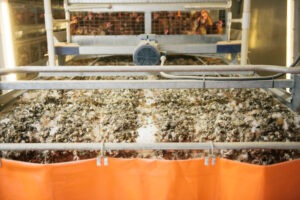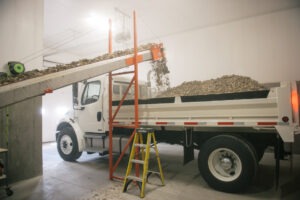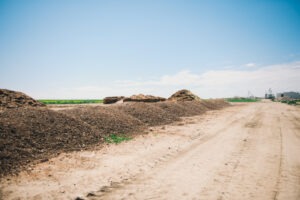Chicken Manure: All Value, No BS!
Most people would probably prefer not to think about, let alone talk about, manure. Poop is a natural part of life that we all have to deal with, yet for most of us, after a quick flush it’s out of sight and out of mind. For egg farmers, however, chicken manure is an incredibly valuable commodity that can contribute to a circular-economy approach to egg farming and the sustainability of Alberta agriculture.
Composted chicken manure provides a slow-release source of macro-nutrients nitrogen, phosphorous, and potassium, as well as important micro-nutrients such as calcium, which is why it is an excellent organic fertilizer. One egg farm composts their combined chicken and cattle manure, which has helped improve their crop yields while drastically lowering their farm’s dependence on synthetic fertilizer. Over the past decade of growing wheat, canola, corn, and beans, their on-farm mixed manure composting program has almost completely eliminated the need for them to purchase additional fertilizer.

While composting chicken manure and applying it to the fields as a natural fertilizer would reduce waste, demonstrate a circular-economy approach to farming, and reduce the need for synthetic fertilizer, many egg farmers in Alberta are finding new ways to capture value from this byproduct. Some egg farmers have found a market for their composted chicken manure as a value-add product worth more than $15 per tonne. There are even organizations like the Centre for Sustainable Food Production at Lethbridge College that are interested in working with farmers to commercialize innovative solutions to make manure transport and application more efficient and cost-effective. One farm hopes to move forward with engineering work in the coming years that would allow for a higher value liquid formulation of poultry manure to be applied to crop fields via irrigation pivot systems.

Some egg farmers have preferred a more collaborative approach that enables multiple farmers to find mutually beneficial solutions that both reduce the cost of production and enhance the sustainability of their farms. One such egg farmer fulfills 100% of a neighboring grain farmer’s fertilizer needs with chicken manure; in return, the grain farmer provides wheat and barley for use in the layer feed, based on an agreed upon value of the manure This unique arrangement not only reduces the egg farmer’s feed costs significantly, but also ensures that nutrients are effectively recycled within the local ecosystem, promoting sustainable agriculture practices beyond the egg farm.

Egg farmers have embraced the circular-economy approach to cultivating a sustainable egg industry in Alberta. This forward-looking strategy not only benefits their own farm but can also have a positive impact on the broader provincial agriculture sector, while minimizing their overall environmental footprint.